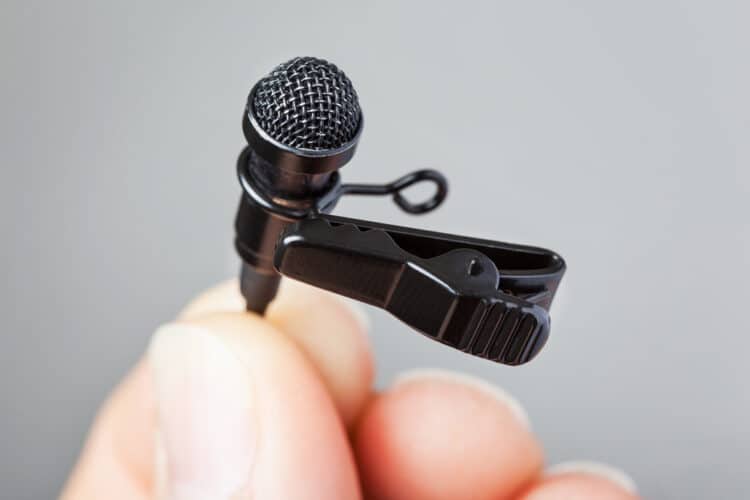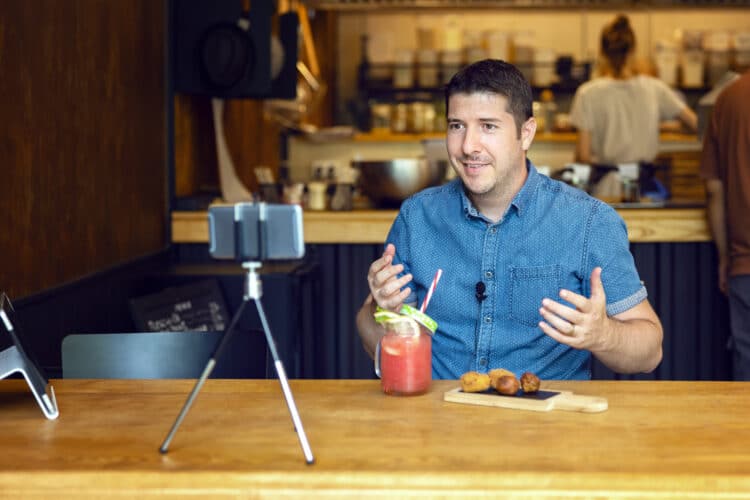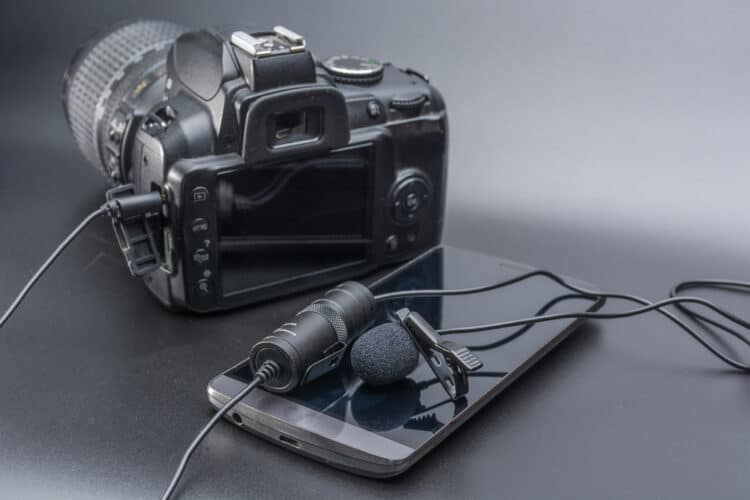Today, we’re talking to all of you delightful creatives out there — musicians, streamers, podcasters, YouTubers, and everyone in between. It’s time to answer a very important question.
“What is a lavalier, and how will one of them make my life easier?”
A lavalier mic is not only super convenient, but it is also a great way to take your content to the next level.
After all, no one wants to watch a video or listen to a stream with audio that sounds far away, right?
With the right lavalier mic, you can easily pump out content with audio on par with the pros. And it’s a lot easier than you might think.
Below, you will find the answers to all of your lavalier related questions.
Let’s dive in.
What Is a Lavalier Microphone?

A lavalier microphone is a discreet microphone that you can clip to your clothing… much like you see on television interviews.
Lavaliers are amazing because they provide you with a simple way to amplify or record your voice in challenging and unique environments.
Musicians, dancers, interviewers, movie producers, and even basketball players are all using lavalier mics these days. Here’s why.
7 Ways a Lavalier Makes Everything Easier
Capture Foley Sounds
First of all, lavaliers are excellent for capturing foley sounds. Foley is the term used to describe sound effects like closing doors, the rustling of paper, or the sound of someone sipping their tea.
And without a doubt, one of the best ways to capture foley sound while you record is with a lavalier microphone.
You see, it’s really easy to keep a lavalier hidden and out of your shot, while still getting as close to the source of the sound, aka the point of reference, as possible.
Talking Head Videos!

Lavaliers are also a simple and affordable way to take your talking head videos to the next level.
This is mostly due to the fact that they are small, and easy to keep out of the shot.
So, with a lavalier, you can place the mic as close to your source as you need it to be.
You can use this to your advantage to capture higher quality audio.
And you can do all of this while keeping all of your equipment out of the shot entirely, as lavaliers are so easily hidden.
Where Is The Best Place To Put A Lavalier Microphone On Someone Appearing In A Video?
The best place for a lavalier mic, in most cases, is clipped as close as possible to your subject’s chest.
If it’s not possible to position it there, some producers get creative and clip it to a necklace, or even into the source’s hair in some cases!
If you’re using a unidirectional (cardioid) lavalier, you need to make sure that the correct side of the mic faces your subject’s mouth. With an omnidirectional mic, this isn’t as much of a concern.
Use With a DSLR

If your favorite camera is a DSLR, a lavalier is a great addition to your gear.
A lavalier mic will give you an entire host of additional mic placement options when combined with your shotgun mics.
Clipping a wireless lav to your subject will give them the ability to roam around within the shot, without getting further away and/or closer to the mic.
This can help to keep the sound consistent when there is a lot of movement.
For example, check out content creator extraordinaire Gary Vaynerchuk, aka GaryVee. He uses a DSLR camera and a lavalier microphone to great effect in many of his hard-hitting content pieces.
And judging by his popularity, he’s obviously doing something right!
The only downside to using a lavalier with a DSLR is that, if your subject’s head tends to move around a lot, you can sometimes come up with less consistent audio than if you were to use a shotgun mic.
As a filmmaker, it is important to figure out what kind of movement can be expected in the shot before you select your microphones.
Capturing Audio in Tough Environments
Lavaliers are some of the best mics out there for recording in tough environments.
Again, thanks to their compact size, you can place a lavalier discreetly anywhere you want to pick up sound, including a stadium full of roaring fans.
For example, audio engineer Dave Grundtvig uses Shure lavalier mics for his setup in the DongGuan BasketBall Center.
He places Lavaliers right on the baskets, and they pick up the sound of the basketball swishing through the net with ease — and no one even knows they are there.
They Are Portable

For all you creatives out there tired of lugging around tons of gear, you should know it’s possible to level up your audio without adding much weight to your pack.
Lavalier mics are super small and incredibly easy to carry from one gig to the next.
So, even if you’re just adding a lavalier mic to your kit, and it’s not replacing anything, you still aren’t adding that much weight to your kit overall.
Most lavaliers, even in their carrying cases, don’t weigh more than a couple of pounds at most.
Of course, lavaliers are not always the best bet. Sometimes, shotgun mics are still the primary piece of audio gear you need in your bag. But it never hurts to have additional options.
And for some instances, lavalier mics can really make the difference.
Lavalier Mics Take up Almost No Space
In addition to being really lightweight, lavalier mics are also incredibly small. That means that even if you add several lavs to your kit, you still won’t need that much extra space.
You probably won’t even need another bag.
Lavaliers are tiny microphones… and the largest parts of a lavalier system are usually the receiver and transmitter; which are still pretty small.
When it comes to microphones, it doesn’t get any more compact than that. Simply stash the case in your current setup, and go.
Get Closer to Your Subjects
In some cases, in order to capture flawless audio, you need to place the mic as close as possible to the subject.
A lavalier mic is a great way to keep the sound capture close-up.
In some cases, getting close to your subject is important. Boom mics and shotgun mics can also be used for this… but in some cases, they don’t allow you to get close enough to really make a difference.
For example… trying to capture quality audio for your film on a DSLR in a massive lecture hall isn’t going to give you much of an opportunity to mic with a boom, and you will be hard-pressed to get close enough to capture audio with a shotgun mic.
In such cases, standing mics on stands in front of the lecturer may not be the best route either, as they will get in the way and keep him/her from being able to pace the stage.
In such specific cases, a lavalier can be a workable, utilitarian option.
Are Lavalier Mics Unidirectional?
Some lavalier mics are unidirectional, which means they pick up sound better from one side than they do the other. However, there are also lavalier mics on the market that are omnidirectional, which means they pick up sound from every direction.
For the most part, unidirectional, aka cardioid lavalier mics, are ideal for things like live lectures, interviews, and presentations because they are pretty good at blocking out background noise.
But, they do have their limitations. They tend to be the most ideal for situations where the subject doesn’t have to move around much.
Also, while unidirectional mics do block out background noise, they are also highly susceptible to things like wind and handling noises… like rustling clothing. So, if you or your subject are on-the-move, you will actually want an omnidirectional lavalier.
You need to clip a unidirectional lavalier to something pretty stable.
But that’s not an issue with an omnidirectional model. You can clip it to anything — including hats, necklaces, and even in your hair.
A Lavalier Could Make Your Life Easier Than Ever
And there you have it.
As a tiny, lightweight, discreet, and yet powerful mic that will make your life easier in many ways, a lavalier can be a great addition to your film or sound kit.
In some cases, they are truly the best way to go for quality audio capture.
